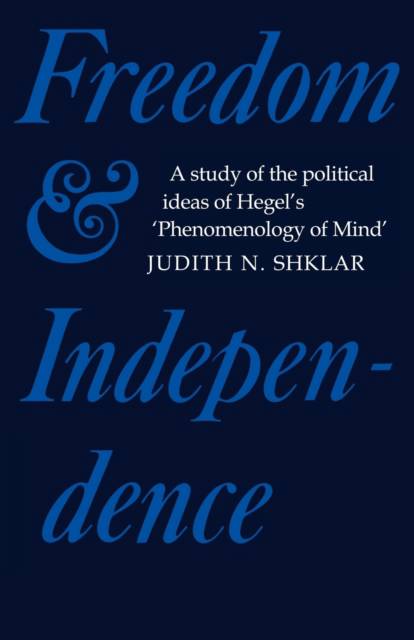
Je cadeautjes zeker op tijd in huis hebben voor de feestdagen? Kom langs in onze winkels en vind het perfecte geschenk!
- Afhalen na 1 uur in een winkel met voorraad
- Gratis thuislevering in België vanaf € 30
- Ruim aanbod met 7 miljoen producten
Je cadeautjes zeker op tijd in huis hebben voor de feestdagen? Kom langs in onze winkels en vind het perfecte geschenk!
- Afhalen na 1 uur in een winkel met voorraad
- Gratis thuislevering in België vanaf € 30
- Ruim aanbod met 7 miljoen producten
Zoeken
Freedom and Independence
A Study of the Political Ideas of Hegel's Phenomenology of Mind
Judith N Shklar
€ 49,45
+ 98 punten
Omschrijving
Originally published in 1976, this book was written specifically to guide students of political theory who want to understand Hegel's political ideas as they appear in The Phenomenology of Mind. Professor Shklar's commentary uses plain language and English translations of references wherever possible. The core of Hegel's argument is that freedom is the identity of the personal goals of individual citizens and the public ends of the polity as a whole. This is a dynamic process, in which all laws are created by each and all, and in turn expressed and realised in the minds and actions of every member of society. The text emphasises Hegel's criticism of every type of subjectivity. The failure to recognise the cultural character of all experience is the core of Hegel's critical review of all past philosophy, and led him to develop his own theory of history and of knowledge as retrospective thinking.
Specificaties
Betrokkenen
- Auteur(s):
- Uitgeverij:
Inhoud
- Aantal bladzijden:
- 236
- Taal:
- Engels
- Reeks:
Eigenschappen
- Productcode (EAN):
- 9780521143240
- Verschijningsdatum:
- 10/06/2010
- Uitvoering:
- Paperback
- Formaat:
- Trade paperback (VS)
- Afmetingen:
- 140 mm x 216 mm
- Gewicht:
- 303 g

Alleen bij Standaard Boekhandel
+ 98 punten op je klantenkaart van Standaard Boekhandel
Beoordelingen
We publiceren alleen reviews die voldoen aan de voorwaarden voor reviews. Bekijk onze voorwaarden voor reviews.









